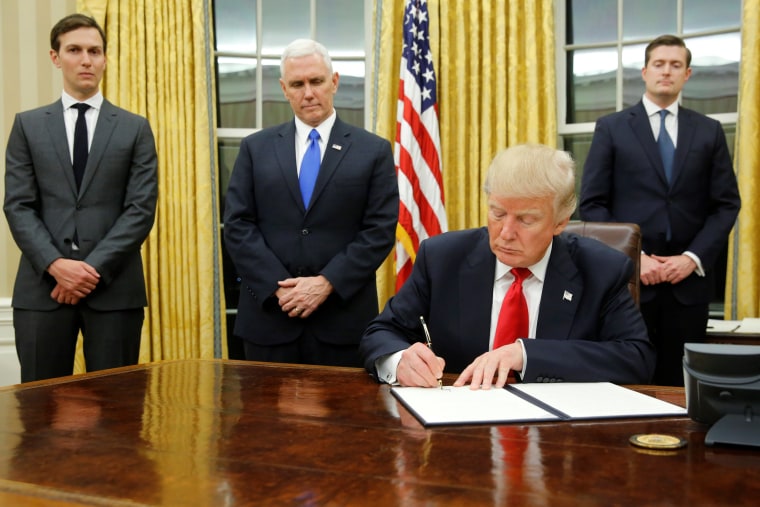Before his election, Donald Trump made all kinds of promises about the sweeping agenda he'd impose on his first day in office. By and large, the new president largely ignored those promises over his first three days.But Trump has nevertheless started to exercise some of his office's considerable power. On Friday, for example, one of the new president's first acts was to overturn an Obama administration policy that made it easier for first-time home buyers and low-income borrowers to afford a mortgage. Soon after, he signed an executive order related to the Affordable Care Act, which was unusually vague, and which experts are still trying to unravel.The New York Times reported that Americans should expect to see quite a bit more along these lines.
President Trump plans to take executive action on a nearly daily basis for a month to unravel his predecessor's legacy and begin enacting his own agenda, his aides say, part of an extended exercise of presidential power to quickly make good on his campaign promises.But in a reflection of the improvisational style that helped fuel his rise, he has made few, if any, firm decisions about which orders he wants to make, or in which order. That is a striking break from past presidents, who have entered office with detailed plans for rolling out a series of executive actions that set a tone for their presidencies and send a clear message about their agendas.
Today's changes will reportedly include executive orders on renegotiating NAFTA and withdrawing the United States from the Trans Pacific Partnership. [Update: the president's actions today also included a federal hiring freeze and new restrictions on international family planning.]Also yesterday, Kellyanne Conway said the new president is prepared to possibly stop enforcing a part of federal health care law he doesn't like -- the individual mandate in the Affordable Care Act -- which would likely have the effect of causing serious harm to the overall system.And while each of these policies deserve to be evaluated on their individual merits, I can't help but wonder where the Republican complaints are about presidential policymaking by fiat.Throughout the Obama era, despite the fact that the Democratic president issued fewer executive orders than any American leader in over a century, Republicans were convinced Obama created a "lawless" presidency in which the White House thought it could make policy without Congress.As regular readers probably recall, every time Obama tired of Congress' inaction and took executive actions, Republicans saw it as evidence of the president's tyrannical tendencies. It's up to elected legislators to approve new policies, we're told, and it's up to chief executives to implement those policies. Anything else represents "executive overreach" that undermines the American system and institutional norms.It was these concerns that were on House Republicans' minds in July when then-candidate Donald Trump met with GOP lawmakers on Capitol Hill, and members sought some assurances about his constitutional principles."I wasn't particularly impressed," Rep. Mark Sanford (R-S.C.) said at the time. "It was the normal stream of consciousness that's long on hyperbole and short on facts. At one point, somebody asked about Article I powers: What will you do to protect them? I think his response was, 'I want to protect Article I, Article II, Article XII,' going down the list."There are seven articles to the U.S. Constitution. There is no Article XII.The point of the exchange, however, was Republicans looking for Trump to commit to a systemic change related to the separation of powers. As House Speaker Paul Ryan (R-Wis.) told "60 Minutes" after the election, he believes Trump "feels very strongly" about the need to shift greater policymaking authority back towards Congress.And yet, here we are, with Trump grabbing his pen and preparing executive orders and actions, even taking aim at policies passed by Congress -- without any input from lawmakers.Since when are Republicans on board with tactics like these? Why was it lawless tyranny when Obama did it, but unworthy of interest when Trump does it?
